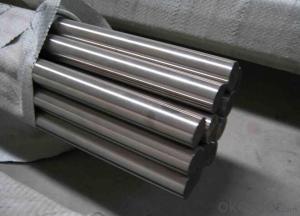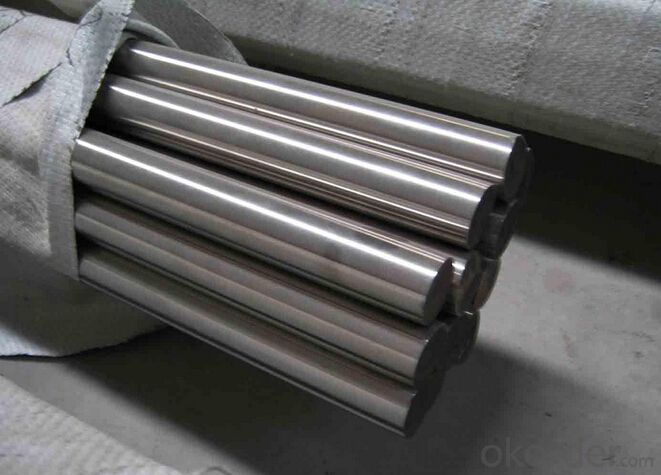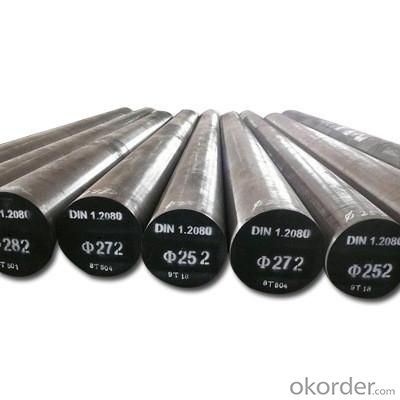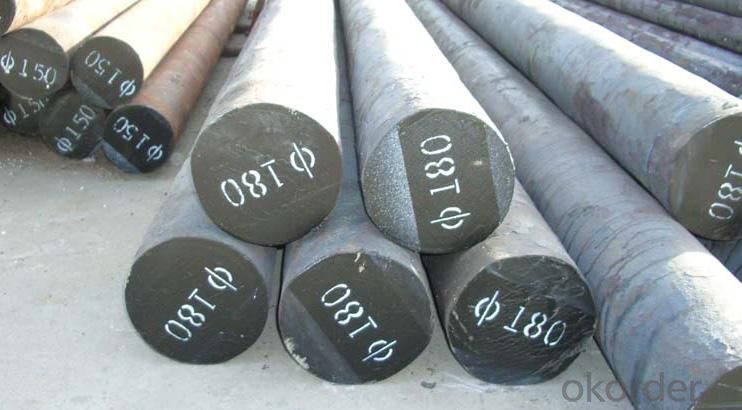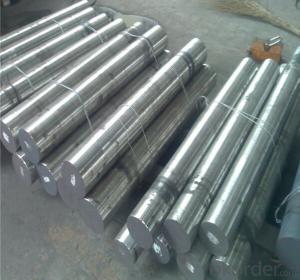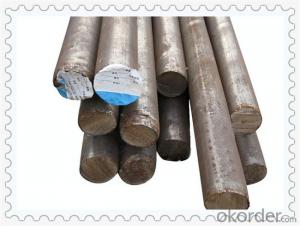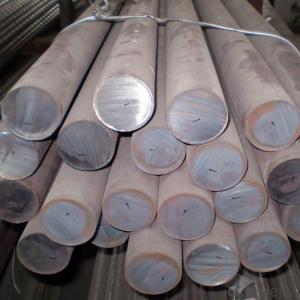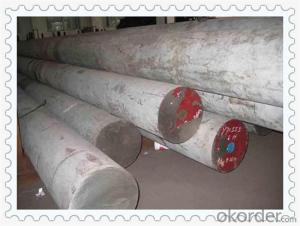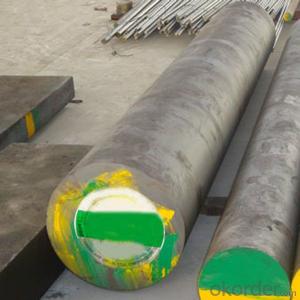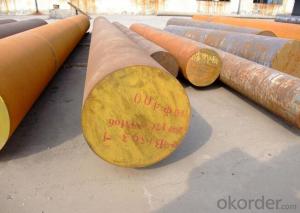42CrMo4 Alloy Structure Steel Round Bar
- Loading Port:
- China main port
- Payment Terms:
- TT OR LC
- Min Order Qty:
- 30 m.t.
- Supply Capability:
- 10000 m.t./month
OKorder Service Pledge
OKorder Financial Service
You Might Also Like
Specification
42CrMo4 Alloy Structure Steel Round Bar
Product Information:
Heat treatment
Soft Annealing: Heat to 780-810°C, cool slowly. This will produce a maximum Brinell hardness of 240.
Stress Relieving: Stress relieving to remove machining stresses should be carried out by heating to 650°C, holding for one hour at heat, followed by air cooling. This operation is performed to reduce distortion during heat treatment.
Hardening: Harden from a temperature of 1080-1160°C followed by air, oil or warm bath quenching. Hardness after quenching is 47-53 HRC.
Tempering :Tempering temperature: See the table bellow.
Tempering Temperature (oC) vs. Hardness (HRC)
Specification :
Size:round
Dia:18mm~220mm
Width:60mm-600mm
Heat treatment:Normalized ; Annealed ; Quenched ; tempered
Surface Condition:Black surface ; Grinded ; Machined
Delivery Condition:hot rolled ; cold drawn ; forged
Payment Terms:T/T;L/C
Trade Terms:FOB;CIF
Application:cold work die steel;hot work die steel;plastic die steel
Product Overviews:
| Product Name | Typical Grades | Diameter(mm) | Standard adopted |
| Carbon Steel | 20 (1020/S20C/C22) | Ø16-Ø300 | GB/SAE/JIS/DIN |
| 40 (1040/S40C/C40) | |||
| 45 (1045/S45C/C45) | |||
| Bearing Steel | GCr9 (51100/SUJ1) | Ø12-Ø250 | |
| GCr15 (52100/SUJ2/100Gr6) | |||
| GCr9SiMn (A485-Gr.1/SUJ3) | |||
| Cr-Mo Steel | 20Cr (5120/SCr420H/20Cr4) | Ø12-Ø250 | |
| 40Cr (5140/SCr440/41Cr4) | |||
| 42CrMo(4140/SCM440/42CrMo4) | |||
| Gear Steel | 20CrNiMo | Ø16-Ø600 | |
| 20CrMn(5115/SMnC420/20MnCr5) | |||
| 20CrNiMo(8620/SNCM220/20CrMiMo2) |
Product Show:

Our Advantages:
· Industry experience over 20 years.
· Shipment of goods -More than 70 countries worldwide.
· The most convenient transport and prompt delivery.
· Competitive price with best service.
· High technical production line with top quality products.
· High reputation based on best quality products.
With our experienced, enthusiastic and dynamic staffs, we assure to bring you the products with best quality, reasonable prices and good after-sales services under the motto: Friends First, Business After.
Communication, Experience, Expertise and Best efforts are our Promises to you.
- Q: What are the different forms of special steel available in the market?
- In the market, one can find various types of special steel, each possessing its own distinct characteristics and uses. Here are some of the most commonly encountered forms: 1. Stainless Steel: A versatile variant of special steel, this type exhibits exceptional resistance to corrosion and staining. It finds widespread application in the manufacturing of cutlery, kitchen appliances, and medical equipment. 2. Tool Steel: Highly durable and resistant to wear and tear, this special steel is primarily employed in the production of cutting tools, molds, and dies. 3. High-speed Steel: Designed to withstand elevated temperatures and maintain hardness even at high speeds, this form is commonly utilized in the creation of drill bits, saw blades, and gear cutters. 4. Alloy Steel: To enhance strength and durability, alloying elements like chromium, nickel, or molybdenum are added to this special steel. It finds extensive use in the automotive industry, construction, and machinery manufacturing. 5. Carbon Steel: This cost-effective type of special steel is favored for its high strength-to-weight ratio. It is commonly employed in the construction of buildings, bridges, and pipelines. 6. Maraging Steel: Known for its exceptional strength and toughness, this low-carbon, high-nickel steel is frequently employed in aerospace and defense applications, including aircraft components and missile casings. 7. Spring Steel: Engineered to withstand high stress and retain its shape under heavy loads, this special steel is widely used in the production of springs, such as those found in automotive suspensions and mechanical devices. These examples merely scratch the surface of the diverse range of special steel available in the market. Each type possesses its own unique properties and applications, rendering them suitable for a multitude of industries and manufacturing processes.
- Q: How does special steel resist oxidation at high temperatures?
- Due to the presence of specific alloying elements and a carefully controlled manufacturing process, special steel is able to resist oxidation at high temperatures. When exposed to oxygen in the air, alloying elements like chromium, nickel, and aluminum form a protective oxide layer on the steel's surface. This layer acts as a barrier, preventing further oxidation. Of these alloying elements, chromium is particularly effective in forming a stable and dense chromium oxide layer. This layer serves as a self-healing mechanism, meaning that if it becomes damaged or scratched, it will quickly regenerate and continue to protect the steel from oxidation. The manufacturing process of special steel involves precise control of composition and heat treatment. This ensures that the steel has a fine and uniform microstructure, minimizing the presence of impurities or defects that could speed up oxidation. Moreover, the steel often undergoes various heat treatments, such as annealing or quenching, which further enhance its resistance to oxidation. In conclusion, the combination of alloying elements, controlled composition, and specific manufacturing processes allow special steel to withstand oxidation at high temperatures. This makes it an ideal choice for applications in industries like aerospace, power generation, and petrochemical.
- Q: What is the difference between general steel and special steel?
- Special steel: it is an important symbol to measure whether a country can become a steel power. It is the main steel used in most industries such as machinery, automobile, military industry, chemical industry, household electrical appliance, shipping, traffic, railway and new industries. China's special steel industry is responsible for the special steel products needed by the key industries such as defense industry, high and new technology industry and machinery and automobile industry. China manufacturing growth to provide a space for the development of domestic special steel, sustained and rapid development of manufacturing industry, especially in machinery, automobile, machinery, shipbuilding and other industries, the strong demand of special steel, become the direct impetus to support excellent steel market.
- Q: How does special steel perform in abrasive environments?
- Special steel performs exceptionally well in abrasive environments due to its high hardness, superior resistance to wear and tear, and excellent corrosion resistance. It is specifically designed to withstand the harsh conditions of abrasive environments, such as those with sand, gravel, or other abrasive particles. The unique composition and properties of special steel enable it to maintain its integrity and durability even when exposed to extreme abrasion, making it an ideal choice for applications in industries like mining, construction, and manufacturing.
- Q: What is the role of cobalt in special steel?
- Cobalt plays a crucial role in special steel due to its unique properties and characteristics. It acts as a key alloying element in the production of high-performance steel alloys, especially those used in demanding applications where strength, hardness, and heat resistance are vital. One of the main roles of cobalt in special steel is to enhance its overall strength and toughness. Cobalt forms a solid solution with iron, resulting in a fine-grained microstructure that improves the steel's mechanical properties. This leads to increased hardness, wear resistance, and the ability to withstand high temperatures and harsh environments. Additionally, cobalt improves the steel's resistance to corrosion and oxidation, making it suitable for applications in extreme conditions such as aerospace, oil and gas, and automotive industries. It also enhances the steel's magnetic properties, making it useful in electrical and electronic devices. Another important role of cobalt in special steel is its ability to promote the formation of stable carbides. The addition of cobalt helps in the precipitation and dispersion of carbides, which contributes to the steel's high-temperature strength and excellent retention of hardness at elevated temperatures. Furthermore, cobalt aids in the refinement of the steel's grain structure, resulting in improved machinability and surface finish. It also allows for better control over the steel's hardenability, which determines its ability to be heat-treated and achieve desired hardness levels. In summary, the role of cobalt in special steel is multifaceted and essential. It enhances the steel's strength, hardness, and toughness, improves its resistance to corrosion and oxidation, and enables it to withstand high temperatures. Cobalt also helps in refining the steel's microstructure, enhancing machinability, and allowing for precise control over its hardenability.
- Q: What is the chemical composition of special steel?
- Special steel encompasses a wide range of steel alloys that possess specific properties and characteristics. The chemical makeup of special steel can differ depending on the particular grade or type of steel being discussed. Nevertheless, special steel typically contains greater amounts of alloying elements compared to regular carbon steel. These alloying elements may consist of chromium, nickel, molybdenum, vanadium, tungsten, and others. The specific combination and proportion of these alloying elements determine the distinctive properties of special steel, such as increased strength, enhanced resistance to corrosion, improved ability to withstand high temperatures, or better resistance to wear and tear. To illustrate, some common variations of special steel include stainless steel, which generally consists of high levels of chromium and nickel, resulting in excellent corrosion resistance; tool steel, which contains high carbon content and often includes additional elements like vanadium or tungsten, making it suitable for cutting, drilling, or shaping tools; and high-speed steel, which incorporates elements such as molybdenum, cobalt, or tungsten, providing exceptional hardness and heat resistance, ideal for use in cutting tools or drills. To summarize, the chemical composition of special steel varies based on the specific type or grade, but it typically involves elevated levels of alloying elements to achieve desired properties such as strength, corrosion resistance, heat resistance, or wear resistance.
- Q: How does special steel contribute to the textile industry?
- Special steel contributes to the textile industry by providing high-strength and durable components for textile machinery, such as looms, knitting machines, and textile processing equipment. The use of special steel in these machines ensures improved performance, precision, and longevity, thereby enhancing productivity and efficiency in textile manufacturing processes. Additionally, special steel's resistance to corrosion and wear helps maintain the quality and reliability of textile machinery, minimizing downtime and maintenance costs for manufacturers.
- Q: What are the factors that affect the machinability of special steel?
- There are several factors that can affect the machinability of special steel. First, the composition of the steel, including the type and amount of alloying elements present, can significantly impact its machinability. Additionally, the hardness and microstructure of the steel, which are influenced by factors such as heat treatment and processing, can also affect how easily it can be machined. Other factors that can play a role include cutting tool selection, cutting speed, feed rate, and coolant or lubricant used during machining.
- Q: Can special steel be used in the pharmaceutical manufacturing industry?
- No, special steel is not typically used in the pharmaceutical manufacturing industry. The industry requires specific materials, such as stainless steel, that meet strict regulatory requirements for cleanliness, corrosion resistance, and compatibility with pharmaceutical products.
- Q: How does special steel contribute to the strength of structures?
- Special steel contributes to the strength of structures by providing enhanced properties such as high tensile strength, durability, and resistance to corrosion. This type of steel is specifically engineered to withstand heavy loads, extreme conditions, and harsh environments. Its superior strength allows for the construction of structures that can support more weight, withstand greater pressures, and resist deformation. Whether used in buildings, bridges, or machinery, special steel plays a vital role in ensuring the structural integrity and longevity of various constructions.
Send your message to us
42CrMo4 Alloy Structure Steel Round Bar
- Loading Port:
- China main port
- Payment Terms:
- TT OR LC
- Min Order Qty:
- 30 m.t.
- Supply Capability:
- 10000 m.t./month
OKorder Service Pledge
OKorder Financial Service
Similar products
Hot products
Hot Searches
Related keywords
